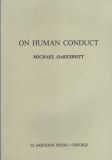用户登陆搜 索 |
查看图书
图书目录:1. ON THE THEORETICAL UNDERSTANDING
OF HUMAN CONDUCT Understanding in general--levels of understanding: recognizing, identifying, theorizing--theoretical inquiry-- its ironic character --orders and idioms of theoretical inquiry--' process ' and ' practice '--instruments of theoretical understanding (sciences), their character and use--virtues and limits of 'psychology' and 'sociology' as instruments of theoretical inquiry concerned with human conduct--the conditionality of theoretical understanding. 'Human conduct' as an ideal character and an instrument of theoretical inquiry--identification of 'doing' as transaction inter homines for the satisfaction of wants--its postulates: 'free' agents, deliberation, persuasion, ' explanation'--further pos- tulates considered--' practical' distinguished from transactional relationship--a 'practice' identified as a 'language'--' moral ' conduct as self-disclosure and self-enactment in terms of the conditions of a non-instrumental 'practice'-- human conduct as ' free' agents related in conditional transactions for the satisfaction of wants. The engagement to theorize a specific human performance or 'practice '--the instrument of theoretical inquiry here--' human nature' and 'social Seine' considered and rejectcd--a perfor mance identified as an eventum, the circumstantial outcome of contingently related beliefs, recognitions, understandings, acknowledgements, responses, etc.--contingent relations dis- tinguished--the theoretical understanding of human perfor- mances identified as historical understanding. II. ON THE CIVIL CONDITION Introduction--the civil condition identified as a mode of human association--its postulate: 'free' agents--two modes of associa- tion distinguished: (1) relationship in terms of a common purpose, (2) relationship in terms of conditions to be subscribed to in choosing and acting--civil association identified as (2)--the mode of association further specified as relationship in terms of' moral', not instrumental, conditions--its postulates: civil law, adjudica- tion, authority and obligation, legislation, politics--conclusion. III. "ON THE CHARACTER OF A MODERN EUROPEAN STATE The emergence of a modern European state from the circum- stances of medieval life and thought a state as an artefact and as a subject of inquiry understood in terms of the constitution and authority of its government understood as a mode of human association the ambiguity of its character thus understood-- specification of this ambiguity in terms of two analogies: societas and universitas the intimations of this ambiguity in a medieval realm and in inquiries concerned with the descriptive and theore- tical understanding of its character--the historic fortunes of a modern European state understood in the terms of societas the historic fortunes of a modern European state understood in the terms of universitas the merits and defects of these analogies. INDEX |

